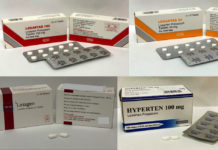Medications for weight loss are not new. Phentermine (brand name: Duromine), for example, has been around for 50years! However, weight loss medications have seen a lull for the past 2 decides- the reason being that they are plagued by safety issues. Some of us will remember Sibutramine (brand name: Reductil), a popular weight loss drug, which was taken off the market in 2010 for increasing the rate of fatal medical conditions such as heart failure and sudden death. The last available drug approved by the Food and Drug Administration, or FDA (and is currently found in Singapore) was Orlistat (brand name: Xenical) over 10 years ago. In fact, Xenical and Duromine are the only 2 weight loss medications available in Singapore today. Talk about lack of choice!
What We Have: Phentermine (Duromine) and Orlistat (Xenical)
Phentermine is an appetite suppressant, but stimulating our bodies to release noradrenaline. It also increases the body’s metabolism to break down fat cells faster. Orlistat, on the other hand, works by preventing the absorption of fat by our intestines, so that ingested fat passes straight through from the mouth to the stools. It is, of course, notorious for its gastrointestinal side effects – stomach upset, oily stools, even leaking of oil. You must have heard countless accounts by horrified users who stole a fart, only to realise oil was dripping out of their behind!
Both Phentermine and Orlistat work – but they are not perfect. Being a sympathomemetic (nervous system stimulant), side effects such as insomnia, irritability, mood changes can occur.
A New Burst of Activity
The recent 2 years has seen a surprising number of medications appearing onto the weight loss medication scene. In 2012, the FDA approved Lorcaserin (brand: Belviq); shortly after, a Phentermine and Topiramate extended-release formula (brand name: Qsymia, pronounced Kyoo-Sim-Mee-yer. Who came up with these names?!). In addition, other medications are in the pipeline, pending FDA approval, such as Bupropion/Naltrexone (brand name: Contrave). Some drugs traditionally used to treat Type II Diabetes are being investigated for their efficacy for weight loss as well!
What to expect: Belviq and Qsymia
 |
| Belviq tablets |
Although approved by the FDA, both Belviq and Qsymia are not yet available here in Singapore, until the Health Sciences Authority (HSA) approves them for prescriptive use here. In the USA, they are currently approved for the management of weight loss in patients whose BMIs are above 30kg/m2, or in patients with BMI above 27kg/m2, and also suffers from at least one weight-related medical condition such as high blood pressure, type 2 diabetes, or high cholesterol.
Although approved at almost the same time, Belviq and Qsymia are very different drugs.
Belviq is a Serotonin 2c receptor agonist. What this means is that it causes weight loss by increasing levels of the ‘feel good’ brain messenger, Serotonin, making you feel fuller with less food. Because of its receptor specificity, it casues less serotonin related side effects (such as constipation and headache), though these can still occur. There were some concerns about Belviq causing heart valve defects in people – but the company conducted studies which showed that the heart problems would not occur at the low doses at which Belviq would be prescribed.
Qsymia, on the other hand, combines two currently approved drugs – Phentermine (currently approved for weight loss, found in Duromine), and Topiramiate – an drug used to treat seizures and migraine.
Topiramate causes weight loss in several ways, including increasing feelings of fullness, making foods taste less appealing, and increasing calorie burning. Phentermine was described earlier in the article. Both components are present in low doses, however, side effects, such as mood changes, insomnia, constipation, can still occur.
Belviq vs Qsymia
 |
| Qsymia capsules |
No head to head comparison study has been done for Belviq and Qsymia. However, their independent trials have shown good results for weight loss, with more than 50% of patients losing at least 5% of their body weight for both drugs. In addition, both drugs seem to improve obesity related metabolic diseases like Type II Diabetes, and high cholosterol (in particular, riased Trglycerides).
Needless to say, the medications should be take with care, and only under the supervision of a doctor. They should be avoided if patients have certain medcial conditions (e.g. psychiatric illnesses, heart valve disease for Belviq) and pregnant or nursing mothers.
While we await the 2 drugs’ approval in Singapore wit bated breath, only time will tell which is the superior drug, with a better safety profile (I personally trust patient feedback more than drug company published studies, which always downplay side effects)
Other New Kids on the Block
There are other drugs in the pipeline. Contrave, which contains the drugs Bupropion and Naltrexone, was supposed to be approved by the FDA earlier this month, but the FDA has since postphoned the approval, pending further review. Naltrexone is actually an opoid antagonist, used for treating alcohol dependence; which Bupropion is an anti-depressant. The 2 act synergistically to promote weight loss through the suppression of appetite and increasing the feeling of satiety.
Interestingly, drugs used to treat Type II Diabetes are now also being studied for causing weight loss in people without diabetes. These include Liraglutide and Canagliflozin. Expectedly, these medications can cause low blood sugar, and will need further testing before they will be made available.
The Bottomline
We talked about weight loss medication here, but as my patients know, I am personally not a big fan of them. They ALL can cause side effects, and if you think about it, they essentially work by: making you feel fuller and eating less!
There are many ways to achieve this, without pharmacoactives. Drinking lots of water, for example is one. Eating lots of fiber, and whole wheats, is another. Also, will power is sometimes what it takes – there is no substitute for making the resolution to eat less, eat healthy and exercise more.
If you need help with your weight management, speak to your doctor for your available options to choose the methods which are best for you!


















